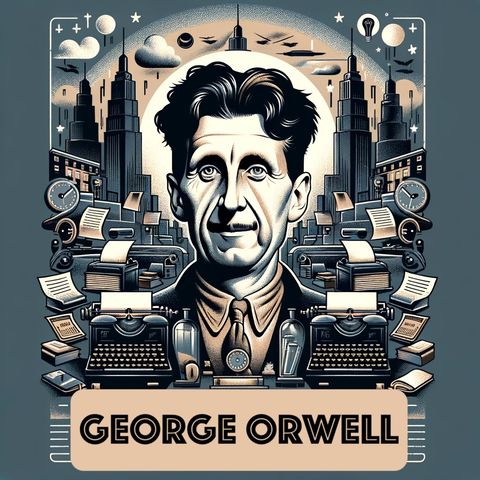George Orwell Biography - Eric Arthur Blair

Descarga y escucha en cualquier lugar
Descarga tus episodios favoritos y disfrútalos, ¡dondequiera que estés! Regístrate o inicia sesión ahora para acceder a la escucha sin conexión.
George Orwell Biography - Eric Arthur Blair
Esta transcripción es generada automáticamente. Ten en cuenta que no se garantiza una precisión absoluta.
Descripción
George Orwell was born Eric Arthur Blair on June 25, 1903 in Motihari, Bengal, India to a British family. His father, Richard Walmesley Blair, worked as a civil servant for...
mostra másThe Blair children were left in the care of various relatives and family friends, first in a small town called Henley-on-Thames, then later at Shiplake near Henley. His guardians sent him to a series of preparatory schools including Hill Top School, Wellington College and to Eton College in 1917, although due to his family's lack of financial means, he relied largely on scholarships to fund his education. Orwell's time at Eton made a tremendous impact on him in later years. He wrote about the institution's emphasis on social class and privilege, which reflected much of the social stratification of English society at the time. His experiences there also informed his later attitude towards the British class system in general and fueled much of the social commentary in his writings.
While at Eton, Orwell co-edited a college magazine called The Election Times with other Eton students. This was his first documented exposure to not just writing, but to editing and publishing as well, experiences which laid the foundation for his future career as a writer. Upon graduating from Eton in December 1921, Orwell returned home and informed his family that he would like to become a writer. However, due to family pressure, he joined the Indian Imperial Police and in 1922 went to Burma to serve with the British Empire.
Orwell served in Burma for five years and rose to the rank of an Assistant District Superintendent which then gave him responsibility over the security of an area containing 200,000 Burmese inhabitants. His years in Burma showed him the brutal realities of imperialism and shaped his later political stance against totalitarianism of any form. He resigned from the Imperial Police in 1927 and returned to England with the aim of making a career as a writer.
Upon returning to Europe, Orwell struggled with illness and lived in poverty for several years. He spent time among the destitute and homeless and learned about the hardships of those living on the margins of society, an experience which also influenced his later works. However, he managed to have his first major work published in 1933 - Down and Out in Paris and London - which was based on his time living in poverty in those two cities. The book received strong critical acclaim and established Orwell as an exciting new talent in the literary world.
He published several novels in the mid 1930's. In 1936, he married Eileen O'Shaughnessy and also traveled to Spain to report on the Spanish Civil War. His experiences on the front lines fighting against fascism led him to develop an intense hatred of all forms of totalitarianism and political repression. This influenced his two most famous works - Animal Farm published in 1945, and 1984 published in 1949, just one year before his death from tuberculosis at the age of 46.
Those two novels solidified Orwell as one of the preeminent voices in 20th century literature. Animal Farm used an allegorical tale about a farm revolution led by the pigs to offer penetrating insights on the corrupting nature of power, the dangers of Soviet-style totalitarian rule, and the ability of political movements to betray their own ideals.
Meanwhile 1984 introduced concepts like Big Brother, thoughtcrime, Newspeak and the practice of doublethink which became part of the common vernacular. The novel painted a chilling portrait of life under a fictional totalitarian government called Oceania and became remarkably prescient about certain aspects of politics, language and society decades after its original publication. Its descriptions of omnipresent government surveillance resonated as new technologies enabled those possibilities in the real world.
Beyond his legendary final two novels which brought him worldwide fame, Orwell left behind an extremely prolific and wide-ranging body of writings and journalism before his untimely death. He wrote prolifically as a literary critic and produced numerous essays and columns touching on literature, language, politics and culture. His non-fiction works consistently displayed his masterful prose, deep wit and command over the English language.
Información
| Autor | QP-4 |
| Organización | William Corbin |
| Página web | - |
| Etiquetas |
Copyright 2024 - Spreaker Inc. an iHeartMedia Company

Comentarios